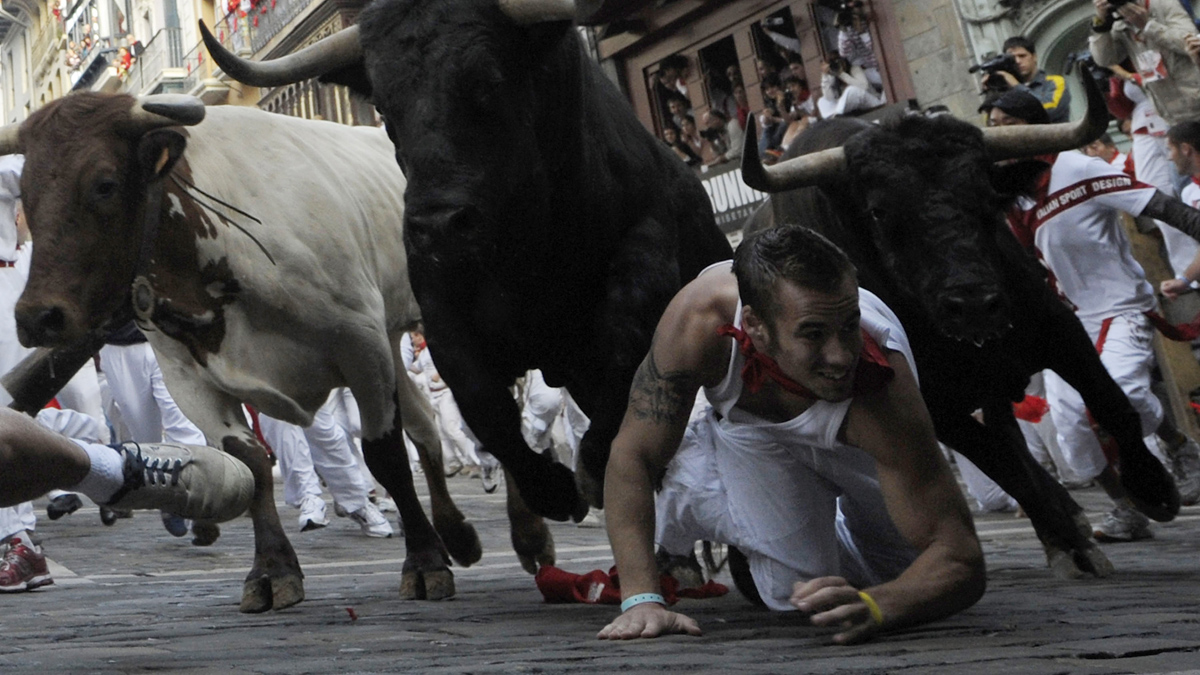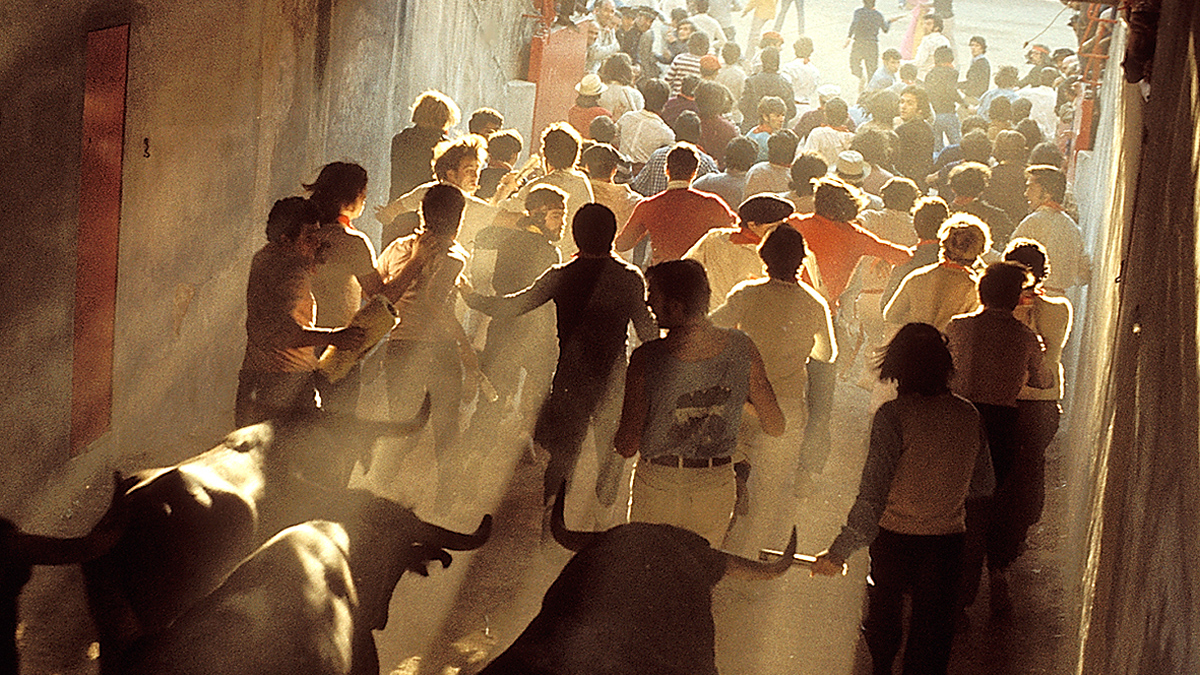San Fermín festival: should running of the bulls be banned?
Briton gored in the groin as Spain's most dangerous – and controversial - festival kicks off in Pamplona

A free daily email with the biggest news stories of the day – and the best features from TheWeek.com
You are now subscribed
Your newsletter sign-up was successful
Several people were injured yesterday on the first day of the San Fermín festival in Pamplona, Spain.
Victims include a Briton who was gored in the groin and at least five Americans who were injured during the running of the bulls, The Guardian reports.
The annual festival draws huge international crowds and is considered by some to be a defining event in Spanish culture, but animal rights activists have long campaigned for the event to be banned and support for the event is waning in Spain.
The Week
Escape your echo chamber. Get the facts behind the news, plus analysis from multiple perspectives.

Sign up for The Week's Free Newsletters
From our morning news briefing to a weekly Good News Newsletter, get the best of The Week delivered directly to your inbox.
From our morning news briefing to a weekly Good News Newsletter, get the best of The Week delivered directly to your inbox.
History
The event began as a religious festival to honour the Navarran city's patron saint, St Fermin, and the running of the bulls was a way to transport the animals from the livestock enclosures to the bullfighting ring. It can be traced back to the 13th century – though people are only thought to have joined the run in the 1800s – and was immortalised by Ernest Hemmingway in his 1926 novel The Sun Also Rises.

Every morning for one week in the beginning of July, rockets signal the release of six bulls onto the cobbled streets of Pamplona alongside thrillseekers dressed in white clothes and red scarves. Each run typically takes just two minutes. Afterwards, the bulls are taken inside the ring and killed by matadors in front of an audience of thousands of cheering spectators.
Why is it allowed to continue?
A free daily email with the biggest news stories of the day – and the best features from TheWeek.com
Supporters of the festival argue that it is celebration of Spanish culture and the event remains the country's second most popular spectator sport after football. It is a vital tourism attraction – particularly during the country's recent economic slump – with tens of thousands of people from all over the world flocking to the region for the event.

American photographer Jim Hollander, who has attended the event for 40 years, believes bull fighting is also a way of maintaining a creature that otherwise wouldn't exist. "If they outlaw bullfighting what will happen is, the fighting bull will become extinct." he said. "It will become a domesticated calf. It will be hamburger meat; and the race, the genus would actually disappear."
Supporters also argue that bulls have longer, happier lives than most farm animals. Responding to animal rights concerns, Spanish philosophy professor Dr Gabriel Avalos told Newsweek: "Where is the fairplay for the 3 million cattle that are killed in the UK, of the 30 million killed in the US, 78 per cent of which are factory farmed, the average age of which at the time of death is 18 months?."
As for the danger to humans, organisers insist the chance of being hit or gored by a bull during the festival "is relatively low."
What are the arguments for banning it?
Hundreds of people are injured every year and over a dozen people have died. In 2009, 27-year old Spaniard Daniel Romero was killed during the run after a bull gored him in the neck, severing his main artery. "If you've ever been to a conker-fighting contest in the UK and been told by health and safety officials you have to wear goggles, it makes you wonder how Pamplona is still allowed to happen," says Sky News correspondent Jason Farrell

The treatment of the animals also draws widespread international criticism. Campaigners argue the bulls are scared and traumatised during the run. Unaccustomed to large crowds and the loud noises of the fiesta, they often fall and break bones and horns trying to escape. In the bullfight that follows, the animals suffer a long and painful death as they are repeatedly stabbed.
"Bullfighting is a cruel blood sport that should have been relegated to the history books a long time ago," argues the animal right group Peta. "No matter what its history is, bullfighting consists of the torture, mutilation and slaughter of animals for entertainment."
There is mounting opposition to the run in Spain; last year Catalonia banned bullfighting, the country' state broadcaster TVE also stopped showing it to "protect children from seeing violence", and opinion polls consistently show that support for bullfighting is falling among the Spanish population.
-
 The ‘ravenous’ demand for Cornish minerals
The ‘ravenous’ demand for Cornish mineralsUnder the Radar Growing need for critical minerals to power tech has intensified ‘appetite’ for lithium, which could be a ‘huge boon’ for local economy
-
 Why are election experts taking Trump’s midterm threats seriously?
Why are election experts taking Trump’s midterm threats seriously?IN THE SPOTLIGHT As the president muses about polling place deployments and a centralized electoral system aimed at one-party control, lawmakers are taking this administration at its word
-
 ‘Restaurateurs have become millionaires’
‘Restaurateurs have become millionaires’Instant Opinion Opinion, comment and editorials of the day
-
 Epstein files topple law CEO, roil UK government
Epstein files topple law CEO, roil UK governmentSpeed Read Peter Mandelson, Britain’s former ambassador to the US, is caught up in the scandal
-
 Iran and US prepare to meet after skirmishes
Iran and US prepare to meet after skirmishesSpeed Read The incident comes amid heightened tensions in the Middle East
-
 Israel retrieves final hostage’s body from Gaza
Israel retrieves final hostage’s body from GazaSpeed Read The 24-year-old police officer was killed during the initial Hamas attack
-
 China’s Xi targets top general in growing purge
China’s Xi targets top general in growing purgeSpeed Read Zhang Youxia is being investigated over ‘grave violations’ of the law
-
 Panama and Canada are negotiating over a crucial copper mine
Panama and Canada are negotiating over a crucial copper mineIn the Spotlight Panama is set to make a final decision on the mine this summer
-
 Why Greenland’s natural resources are nearly impossible to mine
Why Greenland’s natural resources are nearly impossible to mineThe Explainer The country’s natural landscape makes the task extremely difficult
-
 Iran cuts internet as protests escalate
Iran cuts internet as protests escalateSpeed Reada Government buildings across the country have been set on fire
-
 US nabs ‘shadow’ tanker claimed by Russia
US nabs ‘shadow’ tanker claimed by RussiaSpeed Read The ship was one of two vessels seized by the US military